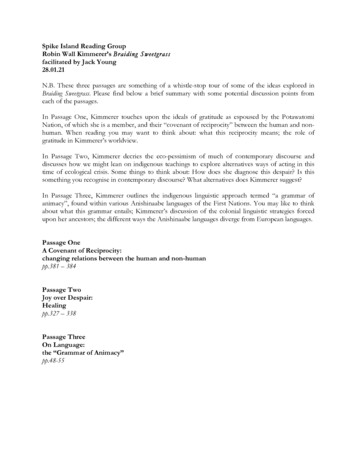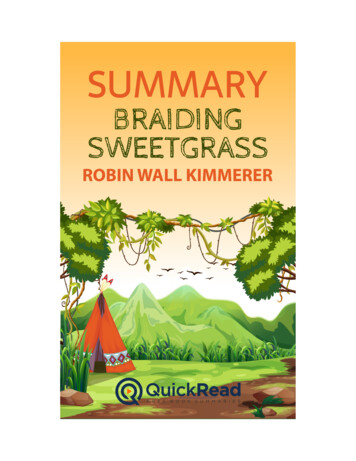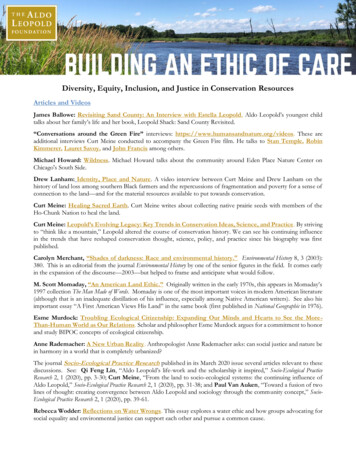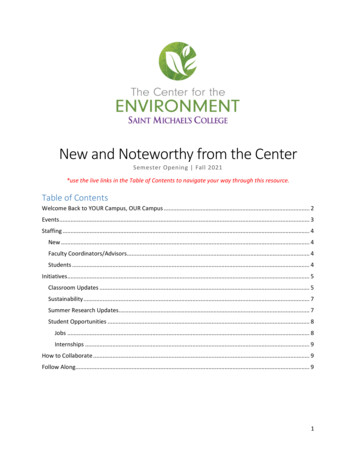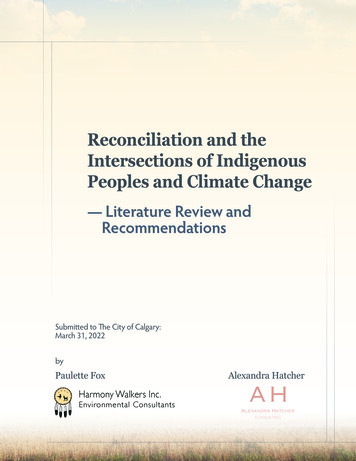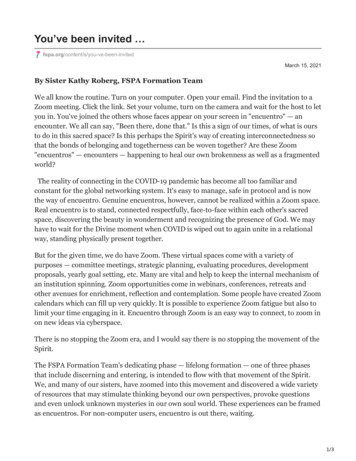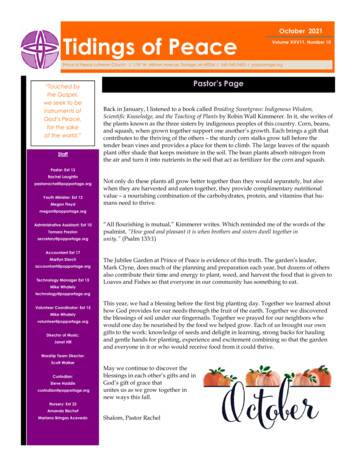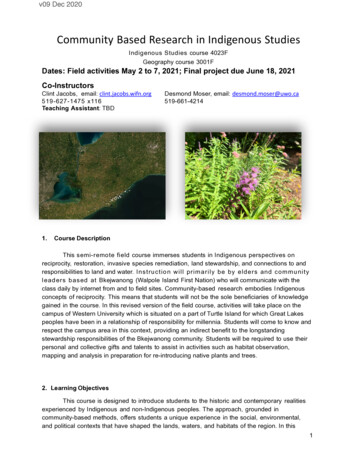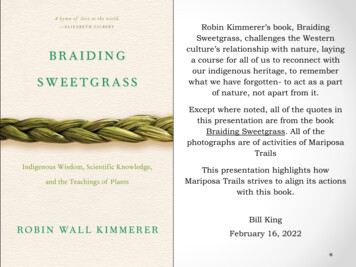
Transcription
Robin Kimmerer’s book, BraidingSweetgrass, challenges the Westernculture’s relationship with nature, layinga course for all of us to reconnect withour indigenous heritage, to rememberwhat we have forgotten- to act as a partof nature, not apart from it.Except where noted, all of the quotes inthis presentation are from the bookBraiding Sweetgrass. All of thephotographs are of activities of MariposaTrailsThis presentation highlights howMariposa Trails strives to align its actionswith this book.Bill KingFebruary 16, 2022
“I dream of a world guided by a lens of stories rooted in the revelations of scienceand framed with an indigenous worldview- stories in which matter and spirit areboth given voice.”
“One of our responsibilities as human people is to find ways to enter into reciprocitywith the more-than-human world. We can do it through gratitude, ceremony, landstewardship, science & art, and in everyday acts of practical reverence.”
Mariposa TrailsThe emotional & spiritual themes from the book“Braiding Sweetgrass” by Robin Kimmerer, listedbelow, played a significant role in the development ofour Vision GiftsGratitudeReciprocityResponsibility
Our VisionWe believe that individuals, communities and the planet can allthrive together, and that this health is attained through relationships ofreciprocity. Through our sojourns, be it hiking, riding, camping or trail-tending,we offer a fresh hope of restoration and invite you to build comradery with oneanother and with nature.
Ceremony “Ceremony is a vehicle for belonging- to afamily, to a people, and to the land.” “Ceremonies transcend the boundaries ofthe individual and resonate beyond thehuman realm. These acts of reverence arepowerfully pragmatic. These are ceremoniesthat magnify life.” “Ceremony marries the mundane to thesacred.”
“Ceremony focuses attention so that attention becomes intention. If you standtogether and profess a thing before your community, it holds you accountable.”
Belonging/Connection ‘Is the land a source of belongings, or asource of belonging?” “I wonder if much that ails our society stemsfrom the fact that we have allowed ourselvesto be cut off from that love of, and from, theland. It is medicine for broken land andempty hearts” “Philosophers call this state of isolation anddisconnection “species loneliness” – a deep,unnamed sadness stemming fromestrangement from the rest of Creation, fromthe loss of relationship.”
“Ceremony is a vehicle for belonging- to a family, to a people, and to the land.”
Relationship “Cultural survival depends onhealthy land and a healthy,responsible relationship betweenhumans and the land.” “Restoring land without restoringrelationship is an empty exercise.” “It’s not just land that is broken,but more importantly, ourrelationship to land.”
“Because the relationship between self and the world is reciprocal, it is not a questionof first getting enlightened or saved and then acting. As we work to heal the earth,the earth heals us.”
Gifts/Gratitude/Reciprocity “I’ve heard it said that sometimes, in returnfor the gifts of the earth, gratitude is enough.But I think we are called to go beyondcultures of gratitude, to once again becomecultures of reciprocity.” “In a culture of gratitude, everyone knowsthat gifts will follow the circle of reciprocityand flow back to you again. This time yougive and next time you receive.” “We are all bound by a covenant ofreciprocity: plant breath for animal breath,winter and summer, predator and prey,grass and fire, night and day, living anddying. Water knows this, clouds know this.Soil and rocks know they are dancing in acontinuous giveaway of making, unmakingand making again the earth.”
“The circle of ecological compassion we feel is enlarged by direct experienceof the living world. In learning reciprocity, the hands can lead the heart.”
Responsibility “To carry a gift is also to carry aresponsibility” “A lot of the time you hear people saythat the best thing people can to fornature is to stay away from it and letit be. There are places where that’sabsolutely true and our peoplerespected that. But we were alsogiven the responsibility to care forland. What people forget is that thatmeans participating- that the naturalworld relies on us to do good things.” “By using materials as if they were agift, and returning the gift throughworthy use, we find balance.”
“The moral covenant of reciprocity calls us to honor our responsibilities forall we have been given, for all that we have taken.”
Mariposa TrailsBuilding Trails and CommunityPO Box 5008-139 Mariposa CA 95338Tax ID# .org
Robin Kimmerer's book, Braiding Sweetgrass, challenges the Western culture's relationship with nature, laying a course for all of us to reconnect with our indigenous heritage, to remember what we have forgotten- to act as a part of nature, not apart from it. Except where noted, all of the quotes in this presentation are from the book
